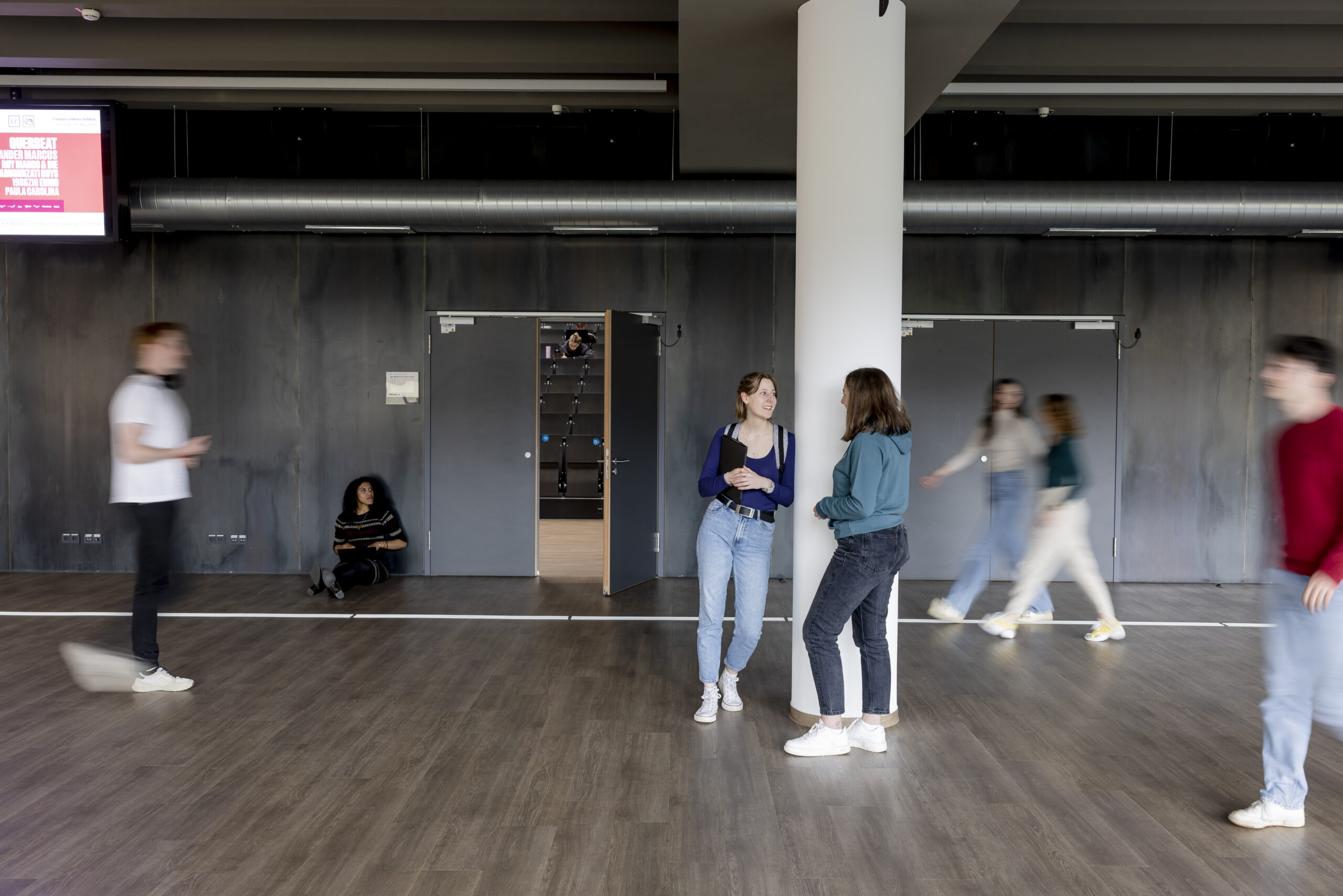
Bachelor
Media studies
Short info about the course of study
| Restricted admission | Standard period of study | Start of studies |
| no | 6 semesters 12 semesters (part-time) | Winter semester |
Authorisation procedure
The degree program is admission-free, you can enroll directly without an application.
Enrolment deadline
16 July – 29 August 2025
completion
Bachelor of Arts
Further information about the degree programme
One Pre-internship for studies in the core subject/extended core subject is required.
Language of instruction
German
The course of study
Anyone studying media studies in Siegen deals with the history, aesthetics and social significance of media. The Bachelor's programme combines research and theory shaped by cultural and social sciences with practice – for visual, auditory, digitally networked and social media. You will learn to analyze different media, understand them theoretically and classify them historically. And last but not least, you will be taught how to design media. You can set your own priorities – from new web technologies, games, film, television, radio to print.

5 Reasons to Study Media Studies
in Siegen
✓ Understanding and designing media
✓ Research and Methods of Media Studies
✓ Theory and analysis close to the material
✓ Learning for practice
✓ High freedom of choice and many additional subjects
Career prospects
The Media Studies programme combines research and theory shaped by cultural and social sciences with practice – for visual, auditory, digitally networked and social media. You will learn to analyze, criticize and design media. This will prepare you for jobs in the media – from new web technologies, games, print, radio, television to film.

This is what Jana Samsonova says about her degree program:
‘practical, forward-looking, relevant’
Read more
Even before it was even clear what I was going to study, I already had a very concrete idea of what was to follow the study: A traineeship in a large media company and then – ideally – a job as an editor.
After a successfully terminated English studies and three years as a freelancer in various editorial offices, I went on the search for a course of study that should prepare me for my desired career. I found it on the website of the University of Siegen. "Of all things", because I knew next to nothing about the city of Siegen. Except that there's a well-known, though not very flattering, joke about her.
Nevertheless, only a month later I moved from my hometown Wuppertal to Siegen to study media studies. It's a good decision, as I know today. The study offered a practical approach that I would not have expected. In addition, the opportunity to set individual priorities and to delve deeper into topics that interest you personally.
Another plus: During the semester break there was enough time for internships in and outside Siegen. Also beyond the study-accompanying internship. During my studies, I was able to complete internships at Westdeutscher Rundfunk and Radio Wuppertal, among others. An internship at Handelsblatt Media Group gave me a job as a freelancer and finally the opportunity to train as a business journalist at the Georg von Holtzbrinck School.
Since then, I have been working as an editor at Solutions by Handelsblatt Media Group. I still benefit from the variety of topics I have been offered in my studies to this day. Because: I deal with a variety of media on a daily basis. It can be helpful to be able to draw on basic knowledge from more than one area. The fact that I can do this is largely thanks to my studies at the University of Siegen.
Admission requirements
The B.A. Media Studies degree programme always begins in the winter semester. Requirements for access are the general university entrance qualification, the subject-specific university entrance qualification or the technical college entrance qualification. Applicants with a subject-specific university entrance qualification or a technical college entrance qualification must meet certain entry requirements: Information on application and enrolment.
Before the start of studies, a four-week pre-study internship in one of the central media areas (in particular the press, radio, film, advertising, public relations, cultural work, online editing, web and software development, social media, library, archive) must be proven before the start of studies, at the latest by 30 September, for studies in the extended core subject and in the core subject. Please note the other Information about the pre-study internship.
Study structure
In the subject bachelor's degree program of the Faculty of Arts and Humanities, you can combine different subjects in a variety of ways:
| compartments | 1-subject course of study | Studyable as Advanced core subject | Core subject | Complementary subject |
| Christian Theologies from an Ecumenical Perspective | ✓ | ✓ | ||
| Digital Media and Technologies (1) | ✓ | |||
| European business communication | ✓ | |||
| Film studies (1) | ✓ | |||
| history | ✓ | ✓ | ✓ | |
| History of Art (Faculty II) | ✓ | |||
| Literature, culture, media | ✓ | ✓ | ✓ | ✓ |
| Media Management (Faculty III) (2) | ✓ | |||
| Media studies | ✓ | ✓ | ✓ | |
| philosophy | ✓ | ✓ | ✓ | |
| Play and Games Studies (1) | ✓ | |||
| sociology | ✓ | ✓ | ✓ | ✓ |
| Social Sciences in Europe | ✓ | |||
| Language and communication | ✓ | ✓ | ✓ | ✓ |
| Economics (Faculty III) | ✓ | |||
2: Media management can only be studied in combination with media studies as a (extended) core subject.

Advice and contact
Make an appointment now at:
info.studienberatung@zsb.uni-siegen.de
or by phone at: 0271 740-2712
(Mon – Thu: 9 a.m. - 4 p.m. / Fri: 9 a.m. – 12 noon)